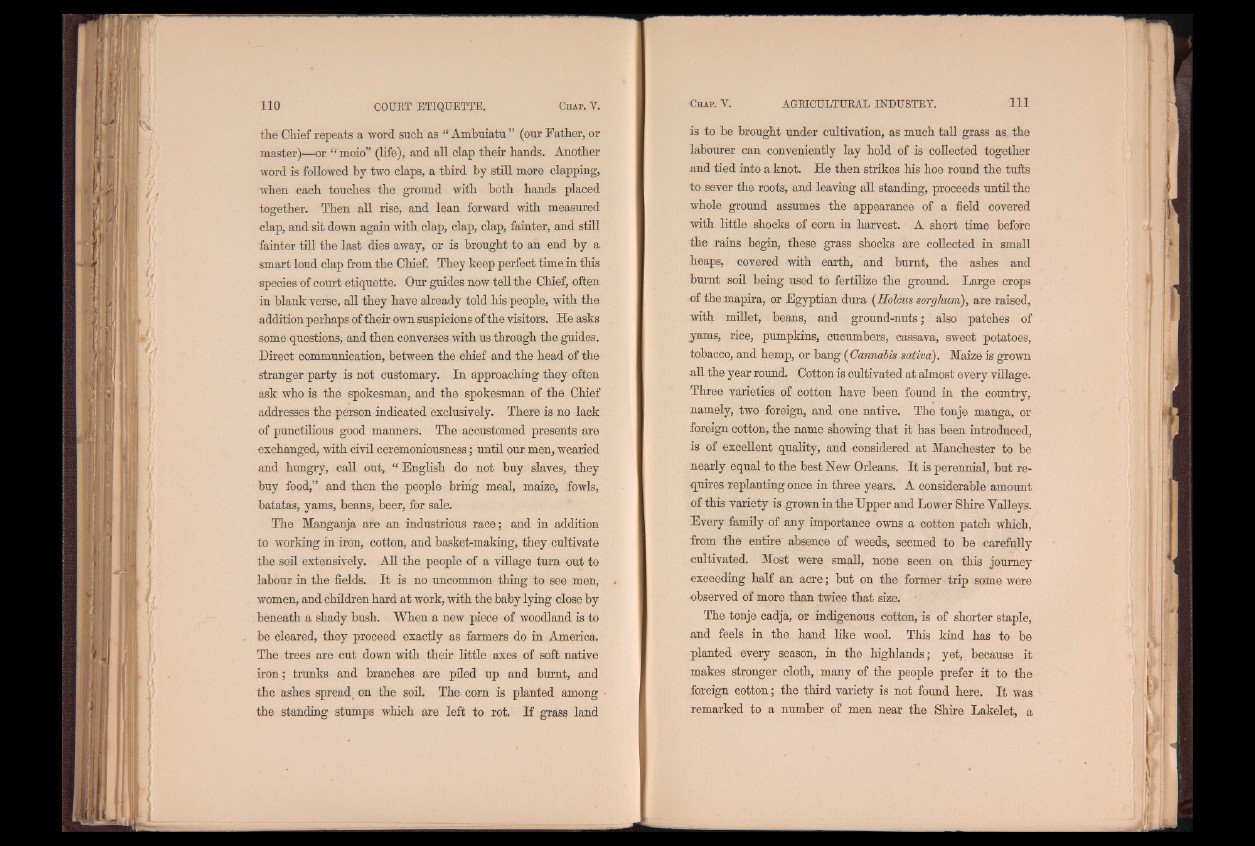
the Chief repeats a word such as “ Ambuiatu ” (our Father, or
master)—or “ moio” (life), and all clap their hands. Another
word is followed by two claps, a third by still more clapping,
when each touches the ground with both hands placed
together. Then all rise, and lean forward with measured
clap, and sit down again with clap, clap, clap, fainter, and still
fainter till the last dies away, or is brought to ah end by a
smart loud clap from the Chief. They keep perfect time in this
species of court etiquette. Our guides now tell the Chief, often
in blank verse, all they have already told his people, with the
addition perhaps of their own suspicions of the visitors. He asks
some questions, and then converses with us through the guides.
Direct communication, between the chief and the head of the
stranger party is not customary. In approaching they often
ask who is the spokesman, and the spokesman of the Chief
addresses the person indicated exclusively. There is no lack
of punctilious good manners. The accustomed presents are
exchanged, with civil ceremoniousness; until our men, wearied
and hungry, call out, “ English do not buy slaves, they
buy food,” and then the people bring meal, maize, fowls,
batatas, yams, beans, beer, for sale.
The Manganja are an industrious race; and in addition
to working in iron, cotton, and basket-making, they cultivate
the soil extensively. All the people of a village turn out to
labour in the fields. I t is no uncommon thing to see men,
women, and children hard at work, with the baby lying close by
beneath a shady bush. When a new piece of woodland is to
be cleared, they proceed exactly as farmers do in America.
The trees are cut down with their little axes of soft native
iron; trunks and branches are piled up and burnt, and
the ashes spread^ on the soil. The corn is planted among
the standing stumps which are left to rot. If grass land
is to be brought under cultivation, as much tall grass as, the
labourer can conveniently lay hold of is collected together
and tied into a knot. He then strikes his hoe round the tufts
to sever the roots, and leaving all standing, proceeds until the
whole ground assumes the appearance of a field covered
with little shocks of corn in harvest. A short time before
the rains begin, these grass shocks are collected in small
heaps, covered with earth, and burnt, the ashes and
brunt soil being used to fertilize the ground. Large crops
•of the mapira, or Egyptian dura (Holms sorghum), are raised,
with millet, beans, and ground-nuts; also patches of
jams, rice, pumpkins, cucumbers, cassava, sweet potatoes,
tobacco, and hemp, or bang (<lanndhis sativa). Maize is grown
all the year round. Cotton is cultivated at almost every village.
Three varieties of cotton have been found in the country,
namely, two foreign, and one native. The tonje manga, or
foreign cotton, the name showing that it has been introduced,
is of excellent quality, and considered at Manchester to be
nearly equal to the best Hew Orleans. It is perennial, but requires
replanting once in three years. A considerable amount
of this variety is grown in the Upper and Lower Shire Yalleys.
Every family of any importance owns a cotton patch which,
from the entire absence of weeds, seemed to be carefully
cultivated. Most were small, none seen on this journey
exceeding half an acre; but on the former trip some were
observed of more than twice that size.
The tonje cadja, or indigenous cotton, is of shorter staple,
and feels in the hand like wool. This kind has to be
planted every season, in the highlands; yet, because it
makes stronger cloth, many of the people prefer it to the
foreign cotton; the third variety is not found here. I t was
remarked to a number of men near the Shire Lakelet, a